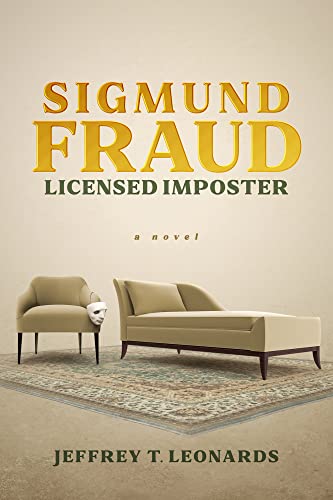SIGMUND FRAUD: LICENSED IMPOSTER by Jeffrey T. Leonards shows a bleak picture of what happens when a medical health professional fails to follow the advice given in Luke: Physician, heal thyself! Brayden Mitchell’s marriage is essentially a sham; he and his wife barely talk and he suspects her of having an affair even as he tentatively moves towards having one himself. Depression over this and some unconscious traumas bubbling up from his past are driving him into the arms of alcohol and cigarettes, not to mention his far-too-attractive new office assistant. And his patients are struggling with problems that frequently, he is basically helpless to help them solve, or who refuse to help with their own cure.
Leonards gives the reader an honest view of Mitchell slipping into darkness and his efforts to climb back out – his mistakes aren’t papered over or justified, or at least not without making it clear that that is what he’s trying and failing to do for himself. His life is reflected in the problems of his patients – the tendency to self-medicate in the face of chronic pain, the agony of loss and the fear of anticipated loss, and the problems that happen when people try to cover over and deny their grief rather than express and deal with it. His efforts to help and guide his patients through their issues reflects and illustrates his inability to cope with his own, to take the very same sensible and professional advice he dispenses, and it’s only when he can step back and take a look at himself through the same lens that he sees his own need to get help to crawl out of the hole he’s dug for himself. Carole, his wife, remains an enigmatic character, hidden behind Brayden’s sense of loss, betrayal, and loneliness, and when the reader finds out what is driving her, the revelation is simultaneously a clear explanation of what triggered the breakdown in their marriage and the first revelation of the traumas still unconsciously driving Brayden’s behavior.
At least one of these revelations feels as though it comes out of nowhere and is just thrown in to add to the traumas, since the reader is given no hint of it until the very end of the book, but the others are real and potent and explain a great deal once understood. The resolution is optimistic and hopeful, but not unreasonably rosy. In the long run, the book’s message seems to say, the physician, like the patient, is only human, with human trauma and human heartbreaks, and needs to keep a close eye on his own health in order to be the healer his patients need.
SIGMUND FRAUD: LICENSED IMPOSTER by Jeffrey T. Leonards is a poignant and moving look at the crumbling personal life of a psychologist, reflected and refracted in the lives of the patients he’s trying to help.
~Catherine Langrehr for IndieReader

